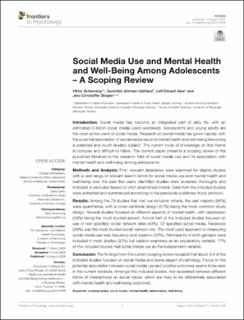| dc.contributor.author | Schønning, Viktor | |
| dc.contributor.author | Hjetland, Gunnhild Johnsen | |
| dc.contributor.author | Aarø, Leif Edvard | |
| dc.contributor.author | Skogen, Jens Christoffer | |
| dc.date.accessioned | 2021-02-19T11:59:40Z | |
| dc.date.available | 2021-02-19T11:59:40Z | |
| dc.date.created | 2020-09-23T10:38:17Z | |
| dc.date.issued | 2020-08 | |
| dc.identifier.citation | Schønning, V., Hjetland, G.J., Aarø, L.E., Skogen, J.C. (2020) Social Media Use and Mental Health and Well-Being Among Adolescents – A Scoping Review. Frontiers in Psychology, 11 | en_US |
| dc.identifier.issn | 1664-1078 | |
| dc.identifier.uri | https://hdl.handle.net/11250/2729213 | |
| dc.description.abstract | Introduction: Social media has become an integrated part of daily life, with an estimated 3 billion social media users worldwide. Adolescents and young adults are the most active users of social media. Research on social media has grown rapidly, with the potential association of social media use and mental health and well-being becoming a polarized and much-studied subject. The current body of knowledge on this theme is complex and difficult-to-follow. The current paper presents a scoping review of the published literature in the research field of social media use and its association with mental health and well-being among adolescents.
Methods and Analysis: First, relevant databases were searched for eligible studies with a vast range of relevant search terms for social media use and mental health and well-being over the past five years. Identified studies were screened thoroughly and included or excluded based on prior established criteria. Data from the included studies were extracted and summarized according to the previously published study protocol.
Results: Among the 79 studies that met our inclusion criteria, the vast majority (94%) were quantitative, with a cross-sectional design (57%) being the most common study design. Several studies focused on different aspects of mental health, with depression (29%) being the most studied aspect. Almost half of the included studies focused on use of non-specified social network sites (43%). Of specified social media, Facebook (39%) was the most studied social network site. The most used approach to measuring social media use was frequency and duration (56%). Participants of both genders were included in most studies (92%) but seldom examined as an explanatory variable. 77% of the included studies had social media use as the independent variable.
Conclusion: The findings from the current scoping review revealed that about 3/4 of the included studies focused on social media and some aspect of pathology. Focus on the potential association between social media use and positive outcomes seems to be rarer in the current literature. Amongst the included studies, few separated between different forms of (inter)actions on social media, which are likely to be differentially associated with mental health and well-being outcomes. | en_US |
| dc.language.iso | eng | en_US |
| dc.publisher | Frontiers Media S.A | en_US |
| dc.rights | Navngivelse 4.0 Internasjonal | * |
| dc.rights.uri | http://creativecommons.org/licenses/by/4.0/deed.no | * |
| dc.subject | psykologi | en_US |
| dc.subject | sosiale medier | en_US |
| dc.subject | ungdommer | en_US |
| dc.subject | mental helse | en_US |
| dc.subject | psykisk helse | en_US |
| dc.title | Social Media Use and Mental Health and Well-Being Among Adolescents – A Scoping Review | en_US |
| dc.type | Peer reviewed | en_US |
| dc.type | Journal article | en_US |
| dc.description.version | publishedVersion | en_US |
| dc.rights.holder | © 2020 Schønning, Hjetland, Aarø and Skogen. | en_US |
| dc.subject.nsi | VDP::Samfunnsvitenskap: 200::Psykologi: 260 | en_US |
| dc.source.pagenumber | 15 | en_US |
| dc.source.volume | 11 | en_US |
| dc.source.journal | Frontiers in Psychology | en_US |
| dc.identifier.doi | 10.3389/fpsyg.2020.01949 | |
| dc.identifier.cristin | 1832399 | |
| dc.relation.project | Regionale forskningsfond Vestlandet: RFF297031 | en_US |
| cristin.ispublished | true | |
| cristin.fulltext | original | |
| cristin.qualitycode | 2 | |

